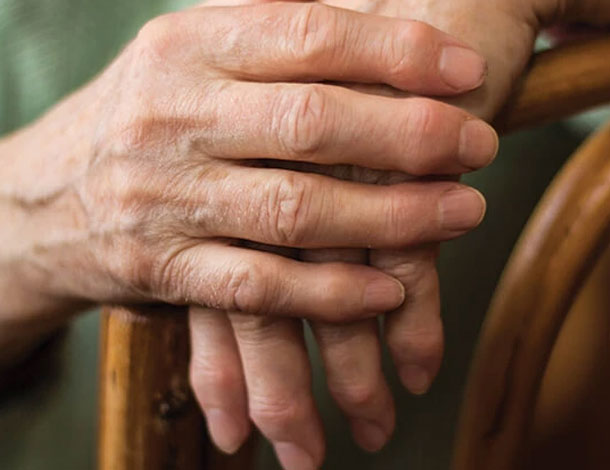Is It Hand Arthritis?: How to Spot the First Signs & Ease Pain

Most of us don’t give too much thought to hand health—until we have pain. We use our hands for nearly everything we do, including the activities we love most. So when those everyday activities begin to become difficult or painful because of conditions like hand arthritis, it can be devastating.
Arthritis in the hands is considered one of the most debilitating forms of arthritis. This blog article will define its most common types and causes, as well as explore options for managing and treating this painful condition.
3 Common Types of Hand Arthritis
There are several different kinds of arthritis, but here we’ll focus on these three types:
- Osteoarthritis
- Rheumatoid arthritis
- Psoriatic arthritis
Osteoarthritis
Osteoarthritis of the hands is the most common cause of hand arthritis. In fact, about half of all women and a quarter of all men will experience it by the time they hit age 85.
Also known as “wear and tear” or degenerative arthritis, osteoarthritis causes the cartilage to break down and wear away. Without that cartilage, your hand bones rub together, leading to pain, stiffness, and loss of movement.
Rheumatoid Arthritis
This type of hand arthritis is a chronic inflammatory disease that causes the lining of the joints to swell, which, like osteoarthritis, leads to pain, stiffness, and loss of movement. Rheumatoid arthritis is considered an autoimmune disease. It typically affects the small joints of your wrists, hands, and fingers.
For most patients, the same joints on both sides of their body are affected by rheumatoid arthritis. So, for example, if you have arthritis in the finger joints of one hand, you’ll likely experience symptoms in the same joints of your other hand as well.
Psoriatic Arthritis
Psoriatic arthritis is a form of hand arthritis that affects your skin and joints. Your fingers will become swollen. You will also likely feel joint pain and stiffness in the mornings with this condition.
Psoriatic arthritis is similar to rheumatoid arthritis in many ways but it may only involve your fingers.
Common Symptoms
Different symptoms can occur depending on the type you have and how advanced your condition is
Frequent signs of hand arthritis include:
- Pain. Depending on how advanced your arthritis is, the pain may be dull or sharp. The pain will come and go or get worse the more you use your hands. Increased pain and stiffness in the morning are also common, and pain may even wake you up at night.
- Swelling. The tissues surrounding your joint may swell and become red and tender to the touch.
- Stiffness. As arthritis progresses, you may experience some loss of motion, and it may become difficult to open and close your fingers completely.
- Weakness. Your hands may become weak and everyday activities—like opening a pickle jar or starting your car—can become difficult.
- Crepitus. When the surfaces of your joints rub together, you may feel a grating, clicking, or cracking sensation.
- Nodules. Bony lumps may form on the middle joint of your finger or at the joint near your fingertip.
- Joint deformity. Finger joints can become large and misshapen due to bone changes, loss of cartilage, loose ligaments, and swelling that can occur with hand arthritis.
What Causes Hand Arthritis?
There are over two dozen bones that make up our hand and wrist. These bones come together to form many tiny joints, which are cushioned with cartilage. When that cartilage becomes worn out or is damaged, the joints can become stiff and painful.
Who’s at Risk of Developing Arthritis in Their Hands?
Hand arthritis can impact anyone, but there are certain risk factors and groups at higher risk of developing the condition, including:
- Age. The older you are, the more likely you are to have hand arthritis.
- Gender. Women are more likely to be affected by hand arthritis than men.
- Race. Caucasians are more often affected than other ethnicities.
- Weight. People who are considered obese are more likely to have hand arthritis than thinner people.
- Genes. Some people are genetically predisposed to develop osteoarthritis, and often at a younger age.
- Past injury. Some people who have previously suffered from a dislocated or broken joint are more likely to develop arthritis over time, even if their hand specialists appropriately treated their injuries.
- Joint problems. Joint infections, loose ligaments, or poorly aligned or overused joints can also lead to hand arthritis.
Diagnosis and Treatment
When being evaluated for hand arthritis, your doctor will examine your hands and joints for signs of the condition. They may also take X-rays to identify any cartilage loss or the formation of bone spurs. This information, along with your medical and family history, will help the doctor make a proper diagnosis.
Depending on the type and severity of your hand arthritis, different treatment options are available to help you manage your symptoms and get back to the activities you enjoy.
Non-Drug Treatments
A brace or splint can be used to reduce the joint strain associated with hand arthritis. Specific hand exercises or hot or cold therapy may also be recommended to help ease arthritis pain.
Drug Treatments
Certain medications for hand arthritis in the form of pills, syrups, or creams may be taken or even injected into the joint, including pain relievers, counterirritants like capsaicin or menthol, and non-steroidal anti-inflammatory drugs (NSAIDs) and corticosteroids.
Surgical Treatments
If the above treatment options don’t provide relief, surgery may be recommended. An orthopedic surgeon can remove the damaged cartilage and fuse bones together or replace the damaged joint with an implant.
Artificial hand joint implants are designed to relieve your pain and can help restore function in your hand. Artificial implants for your fingers and thumb are the latest advancements in the treatment of arthritis.
Get Relief for Hand Arthritis
If you’ve been suffering from painful hand arthritis, our experienced hand specialists can help you feel better.
Take back control of your hands. Request an appointment today.
Prefer to schedule by phone? Call us at (317) 751-5904.




